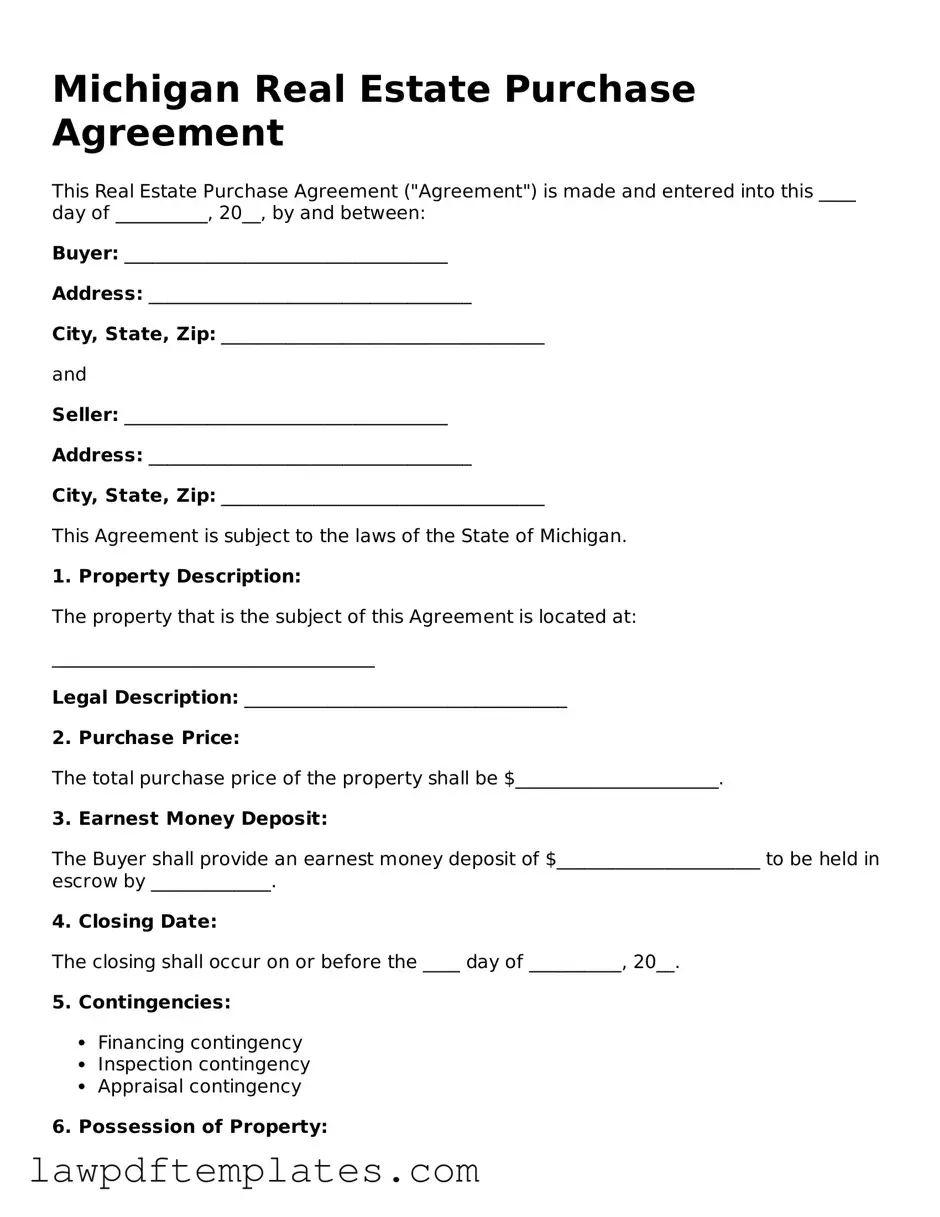Free Real Estate Purchase Agreement Template for the State of Michigan
Form Breakdown
| Fact Name | Details |
|---|---|
| Purpose | The Michigan Real Estate Purchase Agreement is designed to outline the terms and conditions under which a property is sold. |
| Governing Law | This agreement is governed by the laws of the State of Michigan, specifically under the Michigan Compiled Laws. |
| Parties Involved | The agreement typically involves a buyer and a seller, both of whom must be identified clearly. |
| Property Description | A detailed description of the property being sold, including its address and legal description, is required. |
| Purchase Price | The total purchase price must be stated, along with any earnest money deposit required. |
| Contingencies | Common contingencies include financing, inspections, and appraisal, which protect the buyer's interests. |
| Closing Date | The agreement should specify a closing date, which is the date when the ownership of the property will officially transfer. |
| Signatures | Both parties must sign the agreement to make it legally binding, indicating their acceptance of the terms. |
| Disclosures | Sellers are required to provide disclosures regarding the property’s condition, including any known defects. |
Sample - Michigan Real Estate Purchase Agreement Form
Michigan Real Estate Purchase Agreement
This Real Estate Purchase Agreement ("Agreement") is made and entered into this ____ day of __________, 20__, by and between:
Buyer: ___________________________________
Address: ___________________________________
City, State, Zip: ___________________________________
and
Seller: ___________________________________
Address: ___________________________________
City, State, Zip: ___________________________________
This Agreement is subject to the laws of the State of Michigan.
1. Property Description:
The property that is the subject of this Agreement is located at:
___________________________________
Legal Description: ___________________________________
2. Purchase Price:
The total purchase price of the property shall be $______________________.
3. Earnest Money Deposit:
The Buyer shall provide an earnest money deposit of $______________________ to be held in escrow by _____________.
4. Closing Date:
The closing shall occur on or before the ____ day of __________, 20__.
5. Contingencies:
- Financing contingency
- Inspection contingency
- Appraisal contingency
6. Possession of Property:
Possession of the property shall be delivered to the Buyer on the closing date unless otherwise agreed in writing.
7. Additional Terms:
______________________________________________________________
______________________________________________________________
8. Signatures:
By signing below, both parties agree to the terms and conditions set forth in this Agreement.
Buyer Signature: _______________________________
Date: _______________________________
Seller Signature: _______________________________
Date: _______________________________
Common mistakes
Filling out the Michigan Real Estate Purchase Agreement form can be a complex process. One common mistake is not providing accurate property descriptions. This includes failing to include the correct address or legal description of the property. Inaccuracies can lead to confusion and potential disputes later on.
Another frequent error is neglecting to specify the purchase price clearly. The price should be stated in both numerical and written form. Omitting this detail or making it unclear can result in misunderstandings between the buyer and seller.
Buyers and sellers often forget to include important contingencies. Contingencies are conditions that must be met for the agreement to remain valid. Common contingencies include financing and inspection clauses. Leaving these out can expose parties to unnecessary risks.
Additionally, many individuals do not pay attention to the closing date. It is essential to set a realistic timeline for the transaction. An ambiguous or unrealistic closing date can lead to delays and frustration for both parties.
Another mistake involves the failure to disclose any known issues with the property. Sellers are required to provide information about any defects or problems. Not doing so can lead to legal complications after the sale.
Buyers sometimes overlook the importance of earnest money. This deposit shows the buyer's commitment to the purchase. Failing to specify the amount or the terms related to earnest money can create issues later in the process.
Parties may also neglect to review the terms of any included personal property. Items such as appliances or fixtures should be clearly listed in the agreement. Not addressing these details can lead to disputes over what is included in the sale.
Another common oversight is not understanding the implications of the signatures. Each party must sign the agreement to make it legally binding. If signatures are missing or incorrect, the agreement may not hold up in court.
Lastly, individuals often forget to consult with a real estate professional or attorney before finalizing the agreement. While it is possible to fill out the form independently, professional guidance can help avoid costly mistakes and ensure compliance with local laws.
Discover More Real Estate Purchase Agreement Templates for Specific States
Midland Title Toledo - Ensures compliance with state and federal real estate laws and regulations.
For comprehensive guidance on the USCIS I-864 form, it's important to refer to resources that clarify its requirements and implications, such as those found at PDF Documents Hub, which can assist you in navigating the completion of this essential document efficiently.
Nj Real Estate Contract Pdf - It serves as a legally binding contract once both parties have signed it.
Free Nc Real Estate Purchase Agreement - Provides a framework for the sale of multiple properties in a single transaction.
